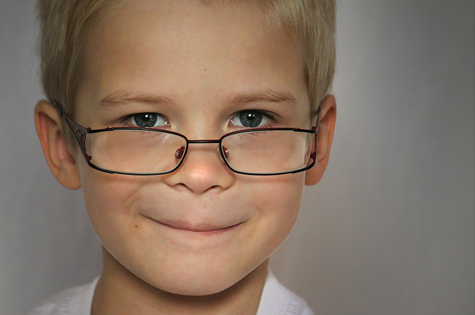It’s alarming to know that one in five children has a vision problem that hasn’t been detected yet
. Good vision is vital for learning – a massive 80 per cent is done via sight
[ii]! Yet, kids of all ages have trouble recognising when they have a problem with their vision. With nothing to compare their sight with, they’ll probably accept that what they’re seeing is normal and that they’re seeing the world in the same way as everyone else. Your child probably won’t be able to talk to you about what they’re experiencing if vision deterioration is slow, too. The result? Frustration, irritation and a loss of concentration or decreased
performance at school.
Common signs and symptoms of vision problems in kids
Vision problems mean that kids can face challenges at school, which are often misdiagnosed as ADHD, dyslexia or other learning difficulties
[iii]. So it’s very important to know the signs. Watch out for:
1. Headaches
2. Eye strain
3. Blurred or double vision
4. Cross eyes or eyes that appear to move independently of each other
5. A dislike of reading and up close work
6. Short attention span during visual tasks
7. Turning or tilting of the head, or closing or covering one eye to read
8. Placing the head very close to a book or desk when reading or writing
9. Constant blinking or eye rubbing
10. Using a finger as a guide while reading and/or often losing where they are up to
11. Slow rate of reading or poor understanding of reading
12. Difficulty remembering what has been read
13. Leaving out words, repeating words or confusing similar words while reading
14. Poor eye-hand coordination.
If your child shows one or more of these symptoms, it could be due to a vision problem.
What to do
Many kids have never had a comprehensive eye examination, which is one reason why vision problems go unrecognised for so many children. Your optometrist is trained to pick up and treat problems effectively. Book your child in for an eye exam at least once every two years – more often if your optometrist recommends it.
And, if your optometrist doesn’t detect a vision problem, your child’s symptoms may be caused by another condition such as dyslexia or another learning disability. Knowing about this early is important and your GP can refer you to an educational specialist to help find the root of the problem. Either way, your child gets the treatment they need.
[ii] Midwestern University. Uncorrected Vision Issues Misdiagnosed as Learning Disabilities
About the Expert
This article is brought to you by the health and wellbeing team at rt health fund, Australia's first registered health fund. A not-for-profit health fund, rt is dedicated to meeting the health cover needs of people working in the transport and energy industries and their families just as it has done for 127 years. rt healthy eyes is located at 1 Buckingham Street, Surry Hills NSW 2010. Call 1300 991 044 to make an appointment or visit
rthealthcentre.com.au for more information.















__small.png)










